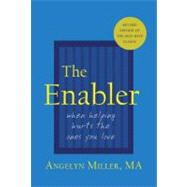
The New copy of this book will include any supplemental materials advertised. Please check the title of the book to determine if it should include any access cards, study guides, lab manuals, CDs, etc.
The Used, Rental and eBook copies of this book are not guaranteed to include any supplemental materials. Typically, only the book itself is included. This is true even if the title states it includes any access cards, study guides, lab manuals, CDs, etc.
During the difficult years of my enabling, I knew that something was wrong. Life had not become what I had believed it would. As I watched my husband and children falter in life, one after another, I viewed the situation first with disbelief and then with panic.
When I married Stan in 1958, I wasnÂ't worried about the future of my relationship with him. I had a degree in human development and family relations from a major university. When I had children -- Tom, John, Nina, and Bud -- I wasnÂ't concerned about what would be required of me as a mother, because I was a credentialed elementary school teacher and knew about children. I should have been ready to be the ideal wife and mother. Indeed, I thought I would be. But my family life evolved through the years in a way for which nothing I had learned prepared me. I moved into a life that was so different from my plans and my imaginings that it took me many years to sort it all out.
The most positive thing I can say about myself during that period is that I did recognize that something was wrong. And, as was typical of our family, it was I who made an effort to understand and find help.
I tried everything. I went to counseling, enrolled in EST training, attended Gestalt workshops, joined encounter groups and womenÂ's support groups, and took assertiveness training and courses in transactional analysis and neurolinguistic programming. I provided myself with an incredible amount of information about personal growth and family dynamics.
But however well armed with ideas I was, it took a series of tragic events to turn this theoretical knowledge into genuine understanding. This is the story of those events. I have written it in response to the frustration I felt at not readily finding an explanation for why our family was functioning poorly.
The myriad theories and techniques, which were often contradictory, only made the picture more obscure. I wanted to see us accurately, to understand what was happening to us. I wanted a coherent interpretation, a focused picture.
Because I thought I was so well trained to be a homemaker, and because I came from a generation of women whose principal goal in life was to produce successful families, I was stunned by the difficulties my family was experiencing. I attributed them mostly to my husband, and then to my children, as they grew older. It had never occurred to me that I could be a major contributor to our problems.
When a counselor finally pointed me toward Janet Geringer WoititzÂ's writings on co-dependence and adult children of alcoholics, I began to understand the dynamics of our family life and my role in it. The concept of Â"enablingÂ" provided the insight I had been searching for. Later still, after I had worked through my own stages of understanding and devised a personal therapy, I came across the Twelve Steps of Alcoholics Anonymous and the complementary steps of Al-Anon. In essence, my process had been similar to the one suggested in the Twelve Steps.
My father was an alcoholic, and I was determined to marry a man who would never abuse alcohol. So I married a man who was also raised in an alcoholicÂ's household and abhorred alcoholism. While my husband did not drink, he did suffer from recurring bouts of anxiety and depression.
After I married Stan, I thought his first episode of depression and anxiety was simply the result of transitory circumstances. I was sure that if I were cheerful enough, helpful enough, accommodating enough, I could make him feel happy and secure -- or I could alter the situation so that he would be happy. His periods of depression were episodic in the same fashion as my fatherÂ's periodic drinking. My pattern of co-dependency was identical to that of the wife of an alcoholic. When my father went on a binge, my mother scurried around making everything right. I did the same with StanÂ's depression. I had moved into a relationship very similar to the classic enabler-alcoholic type.
When I finally recognized myself to be an enabling wife, I began to see that my enabling was not limited to my marriage; it permeated my other relationships as well. I was an enabler to other family members, friends, and especially to my children.
I also discovered that the problem of enabling is much more common than I had supposed, and is not limited to cases of substance abuse. There are a great number of people like myself whose principal way of relating to others is to assume their responsibilities.
Organizations like Al-Anon, and Adult Children of Alcoholics (ACA) have created excellent programs for co-dependents (enablers) of alcoholics and other substance abusers. Their programs, however, overlook the large number of co-dependents of non-alcoholics who could profit from their techniques. While these support organizations donÂ't particularly exclude other types of co-dependents, enablers do not ordinarily think to look their direction.
In my search for useful information that would allow me to understand the dynamics of my family, apart from materials on adult children of alcoholics, I found very little. There seemed a gap in the literature on enabler-dependent relationships of our sort. This book is meant to help fill that gap.